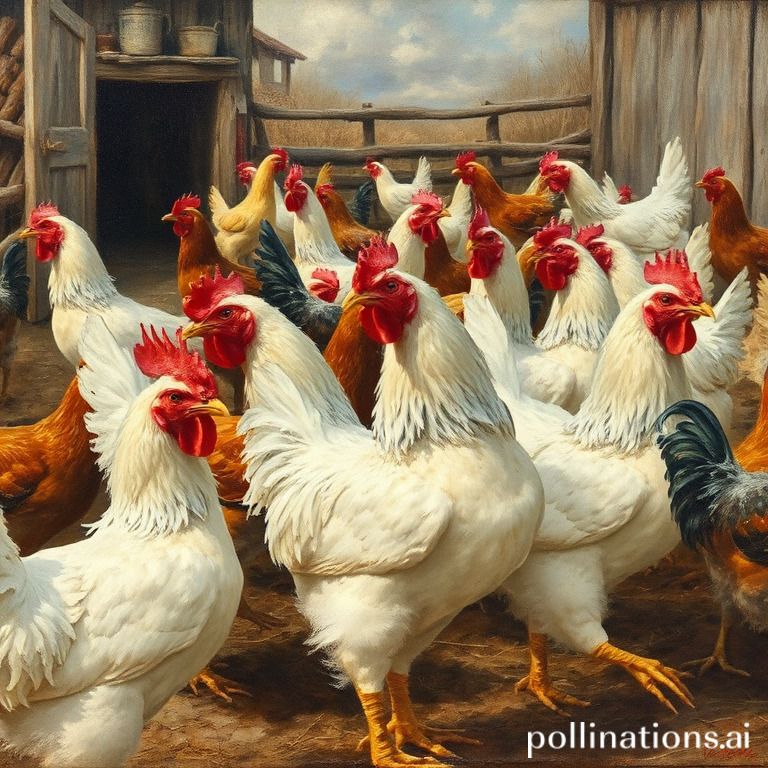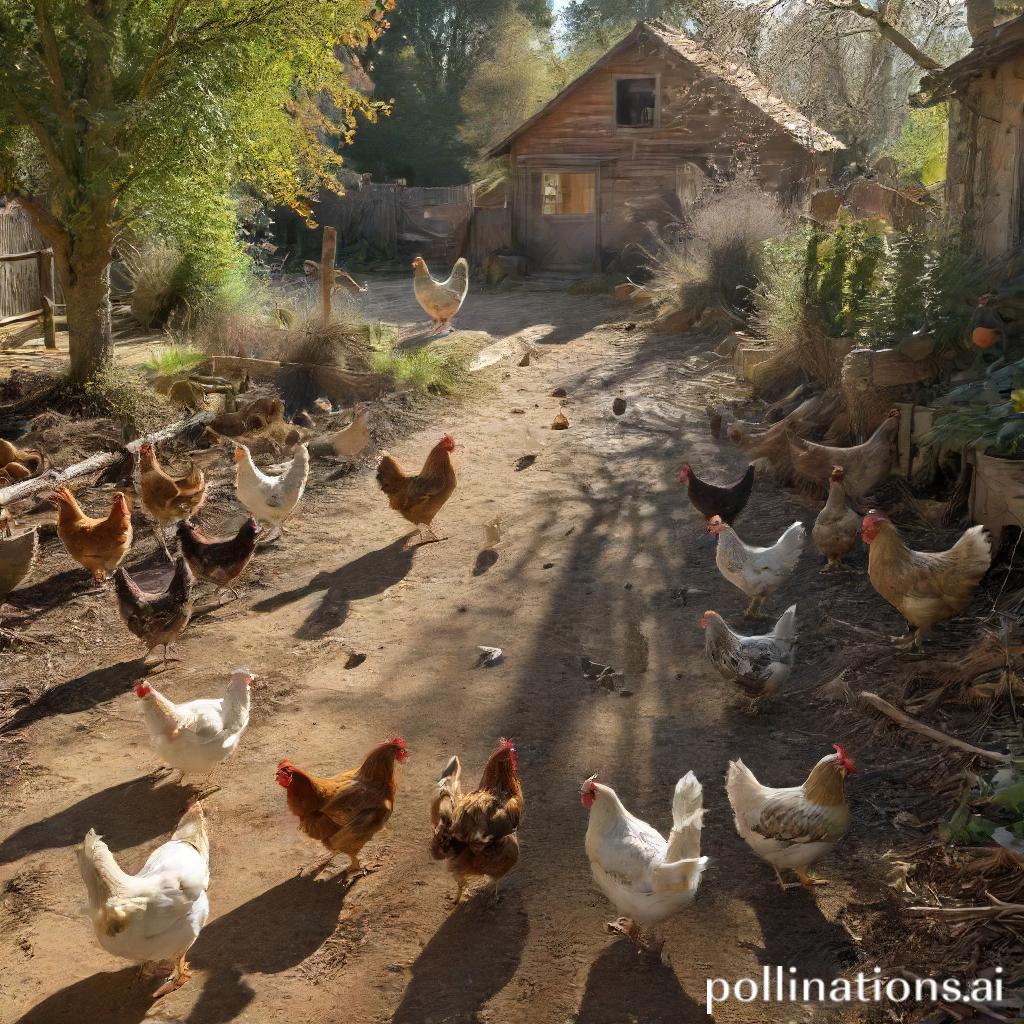Have you ever wondered what you call a gathering of chickens? You’re not alone! Many people are curious about the specific term used to refer to a group of these feathered friends. Well, look no further because we’re here to provide you with the answer.
As for chickens, a collective noun commonly used is “flock.” Yes, that’s right! So, the next time you see a bunch of chickens huddled together, you can confidently say, “Look at that beautiful flock of chickens!” Stay tuned as we explore more fascinating facts about these incredible creatures and their unique social dynamics. Get ready to impress your friends with your newfound chicken knowledge!
Eaton Pet and Pasture, Premium Laying Hen Nesting Pads
Comfort and Quality for Your Hens
Defining the different collective nouns for chickens
1. Examining the term “flock” as a collective noun for chickens
When discussing a group of chickens, the most commonly used collective noun is “flock.” A flock of chickens consists of multiple birds living and moving together as a unit. This term is widely recognized and used in both informal and formal contexts. It is important to note that the size of a chicken flock can vary greatly, ranging from just a few birds to hundreds or even thousands.
2. Alternative collective nouns such as “brood” and “clutch”
In addition to “flock,” there are other collective nouns that can be used to describe a group of chickens. One such term is “brood,” which specifically refers to a group of hens and their offspring. This collective noun emphasizes the maternal aspect of chickens and is often used when discussing the raising and caring for chicks. Another alternative is “clutch,” which is more commonly used when referring to a group of eggs or chicks.
3. Variations in collective nouns based on age or gender of the chickens
The collective nouns used for chickens can also vary based on the age or gender of the birds. For example, a group of baby chickens is often referred to as a “chick brood” or simply a “chick group.” When discussing adult male chickens, the term “roost” or “cock” is sometimes used. It is worth noting that these variations in collective nouns may not be as widely recognized or used as the more general terms like “flock.”

Historical origins of collective nouns for chickens
The historical origins of collective nouns for chickens have evolved over time, showing the cultural importance and evolution of language. These collective nouns give us unique insights into how humans have observed and interacted with chickens throughout history.
1. Tracing the origins of the term “flock” as a collective noun
One of the most commonly used collective nouns for chickens is a “flock.” This term comes from Old English and used to refer to a group of animals, including chickens. The term “flock” emphasizes the social nature of chickens and their tendency to gather and move together.
2. Cultural importance and usage of alternative collective nouns
Aside from “flock,” different cultures have developed alternative collective nouns to describe a group of chickens. These terms not only reflect regional language differences but also provide insights into the cultural significance attached to these animals. For example, in some regions, people use the term “brood” to refer to a group of chickens, highlighting the nurturing and protective nature of mother hens. Other terms like “clutch” or “peep” emphasize the delicate and vulnerable nature of young chickens.
3. Evolution of language in assigning collective nouns for animals
The evolution of language in assigning collective nouns for animals, including chickens, can be attributed to humans’ fascination with categorization and their desire to describe and understand the world around them. As our Absorbing of animals and their behavior has grown, so have the collective nouns we use to describe them. This evolution reflects our changing relationship with chickens and our increasing recognition of their complex social structures and behaviors.
| Collective Noun | Definition |
|---|---|
| Flock | A group of chickens or other animals that gather and move together |
| Brood | A group of chickens, usually consisting of a mother hen and her offspring |
| Clutch | A small group of newly hatched chickens or eggs |
| Peep | A small group of young chickens |
Absorbing the historical origins and cultural significance of these collective nouns deepens our knowledge of chickens and how humans have interacted with them throughout history.
Common Misconceptions About Collective Nouns for Chickens
The concept of collective nouns for chickens can often be misunderstood or misinterpreted. This section aims to clarify common misconceptions and provide a better Absorbing of the topic.
1. Debunking the Misconception that “Bunch” is a Collective Noun for Chickens
Contrary to popular belief, “bunch” is not considered a specific collective noun for chickens. Meanwhile it may be informally used in certain contexts, it is not widely recognized or accepted. Instead, there are several other collective nouns that are commonly used to refer to a group of chickens.
2. Challenging the Idea that Collective Nouns are Universal and Unchanging
3. Addressing Confusion Between Different Collective Nouns for Chickens
There can be confusion Touching on identifying the correct collective noun for chickens. Some commonly used terms include “flock,” “brood,” “clutch,” and “peep.” Each of these terms may have slightly different meanings or usage scenarios. It is important to understand the distinctions between these collective nouns to use them accurately.

Significance of using appropriate collective nouns in communication
Using appropriate collective nouns in communication is vital for increasing clarity and accuracy when referring to groups of chickens. It helps to prevent any confusion and misunderstandings in both written and spoken language. Furthermore, the selection of collective nouns can influence the perception of chickens.
1. Enhancing clarity and precision in communication about groups of chickens
When discussing a group of chickens, utilizing the correct collective noun ensures that the intended meaning is effectively conveyed. It eliminates any confusion or misinterpretation that may arise from using incorrect or general terms. For example, using the term “flock” to refer to a large group of chickens provides a clear and specific Absorbing of the number and purpose of the group.
2. Avoiding ambiguity and misunderstandings in written and spoken language
Using precise collective nouns for chickens minimizes the risk of ambiguity and misunderstandings in communication. Different collective nouns can convey distinct characteristics or behaviors of the group. For instance, the term “brood” specifically refers to a group of chickens raised together by a hen, Meanwhile “clutch” denotes a group of eggs incubated together.
3. Recognizing the impact of collective nouns on the perception of chickens
The choice of collective noun used to describe a group of chickens can shape how they are perceived. For example, using the term “colony” may evoke a sense of a structured and organized community, Meanwhile “mob” could imply a more chaotic or unruly assembly of chickens. The proper use of collective nouns allows for accurate and nuanced representation of the chicken groups.
| Information |
| – Appropriate collective nouns enhance clarity and precision |
| – Using correct terms avoids ambiguity and misunderstandings |
| – Choice of collective nouns impacts chicken perception |
Remember to utilize the appropriate collective noun when referring to groups of chickens to ensure effective communication.
Cultural and linguistic variations in terms for groups of chickens
When referring to a group of chickens, different regions and dialects have their own unique terms. These variations not only demonstrate the linguistic diversity within English-speaking countries but also highlight the influence of cultural traditions on language.
1. Exploring regional and dialectal differences in terms
The terms used for groups of chickens can vary depending on the region or dialect. In some areas, a group of chickens may be called a “flock,” which is a commonly used term worldwide. That being said, certain regions have distinct terms that reflect their cultural heritage. For example, in certain parts of the United States, people may use the term “brood” to describe a group of chickens, At the same time in other areas, the term “clutch” may be preferred.
These regional variations in terms provide insights into the rich linguistic diversity of English-speaking countries. They show how language can evolve and adapt to local customs and traditions, highlighting the cultural diversity within a language.
2. Examining the influence of cultural traditions on terminology
The choice of terms for groups of chickens can be influenced by cultural traditions. In some cultures, certain terms may carry symbolic or metaphorical meanings associated with chickens. For instance, a term may draw inspiration from folklore, agricultural practices, or religious beliefs.
Embracing the influence of cultural traditions on terminology helps us appreciate the connections between language and society. It allows us to recognize the nuances and intricacies of different cultures as reflected in their choice of terms for groups of chickens.
3. Comparing terms used in different English-speaking countries
English is spoken in various countries with their own unique vocabulary and linguistic conventions. Touching on terms for groups of chickens, these variations become apparent.
Comparing the terms used in different English-speaking countries offers fascinating insights into the linguistic diversity within the English language. It allows us to identify similarities and differences, showcasing how language can adapt and evolve in response to cultural and geographical influences.
Conclusion
The collective term for a group of chickens is a “brood” or a “flock.” With their fascinating social dynamics and unique behaviors, chickens thrive in communities where they establish hierarchies and seek safety in numbers.
Whether you’re a chicken enthusiast or simply curious about nature’s wonders, Absorbing the terminology used to describe these remarkable creatures adds to your knowledge and appreciation of the animal kingdom. So, next time you spot a gathering of chickens, remember their collective identity as a brood or flock, and marvel at the fascinating world of these feathered companions.
Frequently Asked Questions (FAQ) about Collective Nouns for Chickens
FAQ 1: What is the most commonly used collective noun for chickens?
The most commonly used collective noun for chickens is “flock.”FAQ 2: Are there any gender-specific collective nouns for chickens?
No, there aren’t any gender-specific collective nouns for chickens. The collective noun “flock” is used for both male and female chickens.FAQ 3: Can collective nouns for chickens vary based on their age?
No, collective nouns for chickens do not vary based on their age. Regardless of their age, chickens are referred to as a “flock.”FAQ 4: Do collective nouns for chickens differ between American and British English?
No, collective nouns for chickens do not differ between American and British English. Both American and British English use the same collective noun “flock” to refer to a group of chickens.FAQ 5: Are there any humorous or creative collective nouns for chickens?
Yes, there are some humorous and creative collective nouns for chickens that are occasionally used. These include “brood,” “clutch,” and “peep.” Meanwhile not as commonly used as “flock,” these alternative collective nouns add a touch of creativity and humor.Read Similar Post:
1. What Kind Of Chickens Have Feathers On Their Feet?
2. How Much Do Broiler Chickens Sell For?

